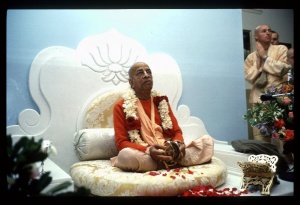CC Madhya 13.79 (1975): Difference between revisions
(Vanibot #0027: CCMirror - Mirror CC's 1996 edition to form a basis for 1975) |
(Vanibot #0020: VersionCompareLinker - added a link to the Version Compare feature) |
||
| Line 2: | Line 2: | ||
<div style="float:left">'''[[Sri Caitanya-caritamrta (1975)|Śrī Caitanya-caritāmṛta (1975)]] - [[CC Madhya (1975)|Madhya-līlā]] - [[CC Madhya 13 (1975)|Chapter 13: The Ecstatic Dancing of the Lord at Ratha-yātrā]]'''</div> | <div style="float:left">'''[[Sri Caitanya-caritamrta (1975)|Śrī Caitanya-caritāmṛta (1975)]] - [[CC Madhya (1975)|Madhya-līlā]] - [[CC Madhya 13 (1975)|Chapter 13: The Ecstatic Dancing of the Lord at Ratha-yātrā]]'''</div> | ||
<div style="float:right">[[File:Go-previous.png|link=CC Madhya 13.78 (1975)|Madhya-līlā 13.78]] '''[[CC Madhya 13.78 (1975)|Madhya-līlā 13.78]] - [[CC Madhya 13.80 (1975)|Madhya-līlā 13.80]]''' [[File:Go-next.png|link=CC Madhya 13.80 (1975)|Madhya-līlā 13.80]]</div> | <div style="float:right">[[File:Go-previous.png|link=CC Madhya 13.78 (1975)|Madhya-līlā 13.78]] '''[[CC Madhya 13.78 (1975)|Madhya-līlā 13.78]] - [[CC Madhya 13.80 (1975)|Madhya-līlā 13.80]]''' [[File:Go-next.png|link=CC Madhya 13.80 (1975)|Madhya-līlā 13.80]]</div> | ||
{{CompareVersions|CC|Madhya 13.79|CC 1975|CC 1996}} | |||
{{RandomImage}} | {{RandomImage}} | ||
==== TEXT 79 ==== | ==== TEXT 79 ==== | ||
| Line 20: | Line 19: | ||
<div class="synonyms"> | <div class="synonyms"> | ||
jayati—eternally lives gloriously; jana-nivāsaḥ—He who lives among human beings like the members of the Yadu dynasty and is the ultimate resort of all living entities; devakī-janma-vādaḥ—known as the son of Devakī (No one can actually become the father or mother of the Supreme Personality of Godhead. Therefore devakī-janma-vāda means that He is known as the son of Devakī. Similarly, He is also known as the son of mother Yaśodā, Vasudeva or Nanda Mahārāja.); yadu-vara-pariṣat—served by the members of the Yadu dynasty or the cowherd men of Vṛndāvana (all of whom are constant associates of the Supreme Lord and are the | jayati—eternally lives gloriously; jana-nivāsaḥ—He who lives among human beings like the members of the Yadu dynasty and is the ultimate resort of all living entities; devakī-janma-vādaḥ—known as the son of Devakī (No one can actually become the father or mother of the Supreme Personality of Godhead. Therefore devakī-janma-vāda means that He is known as the son of Devakī. Similarly, He is also known as the son of mother Yaśodā, Vasudeva or Nanda Mahārāja.); yadu-vara-pariṣat—served by the members of the Yadu dynasty or the cowherd men of Vṛndāvana (all of whom are constant associates of the Supreme Lord and are the Lord's eternal servants); svaiḥ dorbhiḥ—by His own arms, or by His devotees like Arjuna who are just like His own arms; asyan—killing; adharmam—demons or the impious; sthira-cara-vṛjina-ghnaḥ—the destroyer of all the ill fortune of all living entities, moving and not moving; su-smita—always smiling; śrī-mukhena—by His beautiful face; vraja-pura-vanitānām—of the damsels of Vṛndāvana; vardhayan—increasing; kāma-devam—the lusty desires. | ||
</div> | </div> | ||
| Line 27: | Line 26: | ||
<div class="translation"> | <div class="translation"> | ||
" 'Lord Śrī Kṛṣṇa is He who is known as jana-nivāsa, the ultimate resort of all living entities, and who is also known as Devakī-nandana or Yaśodā-nandana, the son of Devakī and Yaśodā. He is the guide of the Yadu dynasty, and with His mighty arms He kills everything inauspicious as well as every man who is impious. By His presence He destroys all things inauspicious for all living entities, moving and inert. His blissful smiling face always increases the lusty desires of the gopīs of Vṛndāvana. May He be all glorious and happy!' | |||
</div> | </div> | ||
Latest revision as of 07:57, 27 January 2020

A.C. Bhaktivedanta Swami Prabhupada
TEXT 79
- jayati jana-nivāso devakī-janma-vādo
- yadu-vara-pariṣat svair dorbhir asyann adharmam
- sthira-cara-vṛjina-ghnaḥ susmita-śrī-mukhena
- vraja-pura-vanitānāṁ vardhayan kāma-devam
SYNONYMS
jayati—eternally lives gloriously; jana-nivāsaḥ—He who lives among human beings like the members of the Yadu dynasty and is the ultimate resort of all living entities; devakī-janma-vādaḥ—known as the son of Devakī (No one can actually become the father or mother of the Supreme Personality of Godhead. Therefore devakī-janma-vāda means that He is known as the son of Devakī. Similarly, He is also known as the son of mother Yaśodā, Vasudeva or Nanda Mahārāja.); yadu-vara-pariṣat—served by the members of the Yadu dynasty or the cowherd men of Vṛndāvana (all of whom are constant associates of the Supreme Lord and are the Lord's eternal servants); svaiḥ dorbhiḥ—by His own arms, or by His devotees like Arjuna who are just like His own arms; asyan—killing; adharmam—demons or the impious; sthira-cara-vṛjina-ghnaḥ—the destroyer of all the ill fortune of all living entities, moving and not moving; su-smita—always smiling; śrī-mukhena—by His beautiful face; vraja-pura-vanitānām—of the damsels of Vṛndāvana; vardhayan—increasing; kāma-devam—the lusty desires.
TRANSLATION
" 'Lord Śrī Kṛṣṇa is He who is known as jana-nivāsa, the ultimate resort of all living entities, and who is also known as Devakī-nandana or Yaśodā-nandana, the son of Devakī and Yaśodā. He is the guide of the Yadu dynasty, and with His mighty arms He kills everything inauspicious as well as every man who is impious. By His presence He destroys all things inauspicious for all living entities, moving and inert. His blissful smiling face always increases the lusty desires of the gopīs of Vṛndāvana. May He be all glorious and happy!'
PURPORT
This is a quotation from Śrīmad-Bhāgavatam (SB 10.90.48).